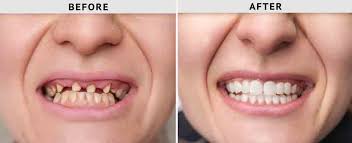Dental implants are widely regarded as one of the most effective, long-lasting solutions for replacing missing teeth. Unlike other options like dentures or bridges, implants offer a permanent, stable, and natural-looking replacement for lost teeth. However, just like any medical procedure, there are factors that influence the longevity of dental implants. We’ll explore how long dental implants typically last, the factors that affect their lifespan, and what you can do to maximize their durability.
What are dental implants?
Dental implants consist of three main components:
- The implant post – This is a small titanium post that is surgically placed into the jawbone to serve as a replacement for the root of the missing tooth. Titanium is used because it’s biocompatible, meaning it can fuse with the bone.
- The abutment – This is the connecting piece that attaches the implant post to the replacement tooth (crown, bridge, or denture).
- The replacement tooth – The visible part of the implant, which is usually made of porcelain or ceramic to mimic the appearance of a natural tooth.

Dental implants are a highly popular solution due to their durability and natural appearance. When placed properly and cared for well, dental implants can last for decades—often much longer than alternative treatments like dentures or bridges.
How long do dental implants typically last?
On average, dental implants can last between 20 to 30 years or even a lifetime with proper care. The implant post itself, which is placed into the jawbone, has the potential to last a lifetime. However, the crown (the visible part of the implant) may need to be replaced after 10 to 15 years due to wear and tear.
This long lifespan is one of the key advantages of dental implants. While other options like dentures or bridges may need to be replaced every 5 to 10 years, dental implants are designed to be a long-term solution. When you consider the cost and time involved in replacing dentures or bridges, dental implants can be a more cost-effective option over the long term.
What are the factors that affect the lifespan of dental implants
While dental implants are known for their durability, their lifespan can vary depending on several factors. Here are some of the key elements that influence how long your dental implants will last:
- Oral hygiene and maintenance – Just like natural teeth, dental implants require regular brushing, flossing, and professional cleanings. Poor oral hygiene can lead to plaque build-up, which can cause gum disease and affect the stability of the implant. Gum infections can damage the surrounding bone and lead to implant failure. Therefore, maintaining good oral hygiene is essential to ensure the longevity of your implants.
- Bone health – The success of dental implants is largely dependent on the health and density of the jawbone. The implant must fuse securely with the bone. If the bone is weak or there is insufficient bone density, the implant may fail. In cases where there is significant bone loss, bone grafting procedures may be necessary before implants can be placed.
- Quality of the implant – Not all dental implants are created equal. The materials used, the design of the implant, and the technology used for its placement can all impact the lifespan. High-quality implants and advanced techniques typically result in better, longer-lasting outcomes.
- Lifestyle factors – Certain lifestyle habits can influence how long your dental implants last. Smoking, for example, can interfere with the healing process and increase the risk of infection and implant failure. Alcohol consumption and poor nutrition can also affect gum health, so maintaining a healthy lifestyle can help increase the lifespan of your implants.
- Implant placement – The skill of the dentist and the surgical process can also affect the outcome of dental implants. A poorly placed implant may be more likely to fail or require adjustments over time. It’s important to work with a skilled and experienced dental professional to ensure the implant is placed correctly.
- Type of Restoration – The type of restoration placed on the implant can also influence its longevity. A well-made crown, bridge, or denture that fits securely will last longer. Over time, restorations can wear down, become damaged, or even become loose, requiring adjustments or replacements.
How do I maximize the lifespan of dental implants?
While dental implants are incredibly durable, taking steps to protect and care for them can ensure they last as long as possible. Here are some tips to help you get the most out of your implants:
- Maintain excellent oral hygiene – Brush your teeth twice a day with fluoride toothpaste and floss daily. Consider using an antimicrobial mouthwash to reduce bacteria and prevent gum disease. Regular dental check-ups (every 6 months or as recommended) are crucial to ensure your implants remain in good health.
- Avoid smoking – Smoking is one of the most significant risk factors for implant failure. It can reduce blood flow to the gums and interfere with the healing process. If you’re a smoker, consider quitting or at least reducing smoking to improve the success rate of your implants.
- Wear a mouth guard – If you grind or clench your teeth, wearing a night guard can protect your implants and prevent unnecessary wear. A custom-fitted mouth guard can shield both the implants and natural teeth from the damaging effects of bruxism.
- Monitor your implant for problems – Pay attention to any discomfort, looseness, or unusual changes in your implant or surrounding gums. If you notice anything out of the ordinary, consult your dentist right away to prevent further damage.

Dental implants are designed to be a long-lasting solution to missing teeth, with the potential to last 20 years or more, even a lifetime. The implant post, when properly cared for, can remain stable in the jawbone for many decades. One way to ensure durability is by getting quality implants and restorations, by a professional dentist who will ensure that all procedures are done in a safe, hygienic and professional way. At Nairobi Sterling Dental Clinic, you get all these in a single package, and at an affordable cost. Visit us at our clinics across Nairobi, access our professional dental implant services and enjoy the best quality of life. We are located at We are located at the Park Suites Building in Parklands Nairobi. You can also contact us for enquiries on dental implants or book your appointment at your convenience. At Nairobi Sterling Dental Clinic, we Make Your Smile Bright.
